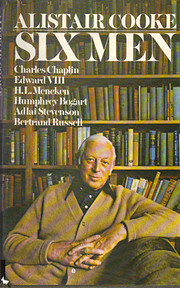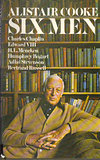

Click on a thumbnail to go to Google Books.
|
Loading... Six Men (1977)by Alistair Cooke
 None No current Talk conversations about this book.   ) )Urbane and witty compendium of six biographical essays; one on each of Chalplin, Mencken, Bogart, Stevenson, Bertrand Russell and Edward VIII. To a certain extent, these are eyewitness accounts, and discuss Cooke's reactions to each of the men. Some items, like the California primary in the 1956 Democratic race, turn up in a few different essays, giving it some linking, even though they were written for different publications. (A rather pointed distaste for McCarthy also shows up a lot, though it's tempered with some healthy skepticism on the likes of Hiss and Wallace.) Quite interesting, and easy to read in the author's "voice." Recommended. William Safire, William F. Buckley, and Alistair Cooke are some of the first writers I go to when I want to be impressed and provoked by masterful English language use. Biography is one of my favorite genres. This book is a convenient combination of my favorites in that it gives me thumbnail biographies of six well-known figures presented in remarkable depth for such a compact presentation. “A Note on Fame and Friendship” is a necessary preface to the work in that it addresses criticisms of the following individual vignettes that a reader may propose. Charles Chaplin is presented in an almost schizophrenic, complete dual personality, model. But Cooke clarifies that to some extent this image was deliberately crafted by Chaplin for sanity preservation. The Edward the VIII section is scant as far as personal interaction between Cooke and the former King, but Cooke admits that while there might not have been a lot of interaction between writer and subject, the story is so important that to fail to remark on it would be inappropriate (for him—Cooke was English, after all). Sections on the two intellectuals (Russell and Mencken), a movie star (Bogart), and a politician (Stevenson) all offer personal observations that add to a general reader’s perception of the humanity of popular heroes. I grew up knowing Cooke only as the "Masterpiece Theater guy" on PBS. I had no knowledge of the other fascinating things he had done in this country and his native one. He shows Bogart in an entirely new light, as a gentleman and a modest, self effacing follower of politics. His portrait of Bertrand Russell includes explanations for how Russell managed to offend just about every institution (and woman, for that matter) that welcomed him, although resurrection often followed. I'm most interested in what he'll have to say about Stevenson. I like Cooke's sometimes pointed, sometimes meandering observations about both his adopted and his native country, and the indefensible ways humans often behave toward others, as well as toward themselves. His is an old fashioned style of writing. Sinking myself into his pages makes me nostalgic for it. Today's writing comes across as phony and too breathless for genuine thought in comparison. no reviews | add a review
Distinctions
Drawing on a lifetime of journalistic encounters with the great and the famous, Alistair Cooke profiles the six extraordinary men who impressed him the most Over the course of his sixty-year career as a broadcaster, television host, and newspaper reporter, Alistair Cooke met many remarkable people of the twentieth century. This entertaining and insightful collection shares his unique, often startling personal vision of six key figures from the worlds of literature, entertainment, and politics. They are: Charlie Chaplin, whom Cooke befriended in Hollywood and who courted controversy in his politics and romances; the charming-yet-naive Edward VIII, whose love affair changed the course of World War II; Humphrey Bogart, the first antihero hero onscreen and a sensitive gentleman at home; H. L. Mencken, brilliant, inspirational, and deeply flawed; Adlai Stevenson, whom Cooke labeled the failed saint; and Bertrand Russell, who had the courage and the audacity to try to make the world a better place. The subjects of Six Men are united by the deep complexities of their characters. In balancing informed details of their lives with an objectivity set against the ever-changing landscape of their times, Six Men is a master course in the art of concise biography. No library descriptions found. |
Current DiscussionsNonePopular covers
 Google Books — Loading... Google Books — Loading...GenresMelvil Decimal System (DDC)920.00904History and Geography Biography, genealogy, insignia Biography General and collective by localitiesLC ClassificationRatingAverage: (3.56) (3.56)
Is this you?Become a LibraryThing Author. |
||||||||||||||||||||||||||||||||||||||||||||||||||||||||||||||||||||||||||||||||||||||||||||||||||||||||||||||||||||||||||